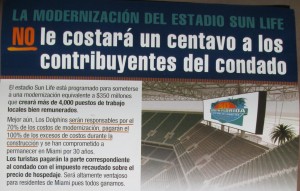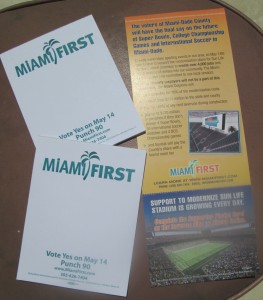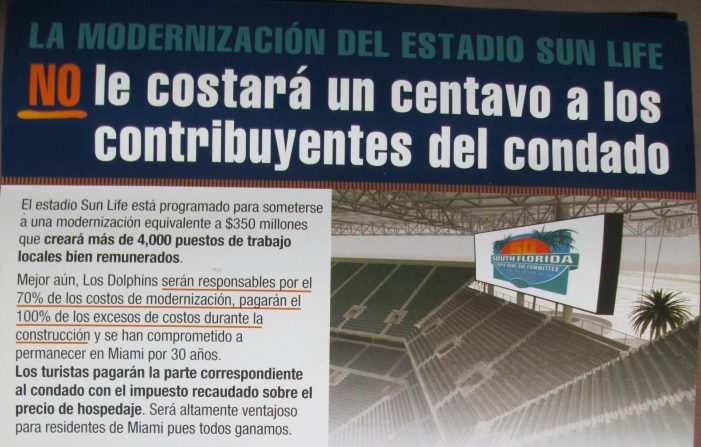
After paying nearly $5 million in a non-refundable fee for an allegedly “longshot” referendum vote, Miami Dolphins owner Stephen Ross has ponied up more than $1 million to sell voters on his plan to use public funds to upgrade his privately-owned SunLife Stadium.
According to the campaign finance reports filed Friday, Ross put in the entire $1 mil Friends of Miami First PAC treasure chest himself, in two checks dated April 12 from his South Florida Stadium, LLC — one for $250,000 and one for $750,000. The other $12,500 come from in-kind donations from the stadium company and the Dolphins — for online marketing, office space, administrative support and $2,500 in tickets that we assume will be gifts to sway fence-sitting leaders.

They’ve already spent more than a third of that, or almost $350,000. Of that, $150,000 is for a phone bank paid to New Partners Consulting, Inc., in Washington, D.C. Then there is almost $200,000 in advertising and “advertising supplies” — whatever that means. Maybe it’s the palm cards and notepads?
The ad costs also include a $2,000 payment to the Miami New Times and almost $30,000 of radio media buys, which I am sure will be a much higher six-figure number by the end of the campaign. I’ve heard one Spanish language commercial multiple times already.
It does not have anything for printing or mailing — even though there are three or four mailers out already — or gasoline for taking volunteers here and there or polling. Of coure, the answer is that the report is only for costs through April 19th, even though it seems that at least one mailer arrived on or about that date. The next report, which will cover the period from April 20 to May 9, is not due til May 10 — four days before the end of the election.
Seems convenient, don’t it?
Gotta admit, I like how Ross is funding the campaign effort himself — if he’s not funneling third party money, that is, from silent partners who did not want to be named in this blog. But I wish he’d do that with the stadium, too.
He’s almost — and probably more than — $6 million in the hole for this already. On a gamble. He doesn’t seem to mind throwing money at propaganda. Why is he so reluctant to spend his own money on his own place?
“He should be putting that money into fixing his property,” agreed Cutler Bay Mayor Edward “Mac” MacDougall, who has put in $50,000 of his own money to try to beat the deal in Tallahassee first and then on the local referendum if it gets that far.
“It’s virtually nothing,” he admits. Especially in light of the $1 mil plus the pro-stadium side already has in the bank. “I do not know how you overcome that kind of money.”
I can think of one way: Car mogul Norman Braman, who has been the most vocal opponent to the Dolphins stadium scam from the beginning. Perhaps he is the only one who can level the playing field.
But he’ll have to put his money where his mouth is.
If he wants, he can have me help him write the messaging and spreading the word on Spanish TV and radio — and at a discount price, just a tiny fraction of the $18,000 Ross is paying for Miami First Coalition co-chair H.T. Smith to be his mouthpiece among Democrats and in the black community.

Smith told Michael Putney — who moderated a “non-debate” at the Downtown Miami Forum last week — that he was being paid $12,000 for April and $6,000 for May. But you know what? The report doesn’t note that. It also doesn’t say what anybody else is being paid — including Roly Marante, the political consultant close to Miami-Dade Commissino Chairwoman Rebeca Sosa, who is doing Hispanic outreach, or the other campaign co-chair, Jorge Arizurieta, who wouldn’t tell me what his compensation as Hispanic Republican cheerleader was getting him.
He told me at one of the community forums last Wednesday to check the campaign report filed Friday.
Guess that’s as transparent as they’re going to get.
Miami First Coalition spokesman Eric Jotkoff told me that Smith’s and Arizurieta’s and Marante’s cheerleading fees will likely be in the next report because “payday is the 30th.”
Another happy coincidence. Ladra knows that many political operatives and campaign workers are paid at the very end exactly for this reason — so that the costs are not reflected until right before and sometimes after the election.
It doesn’t do anything to sway voters their way.

